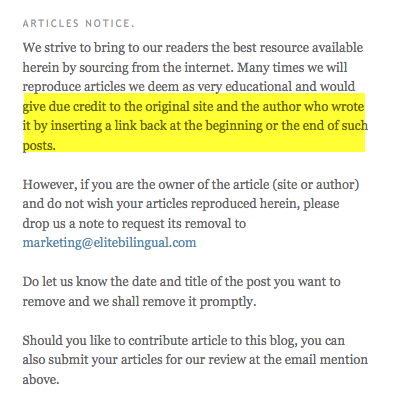I don’t normally like to use my blog as a platform to criticise others. But today I’m making an exception.
[edit 30 October 2009: Scroll to the end for an update]
There are many reasons why I have a blog, and gaining a good, strong Google ranking is just one of them. So I generally don’t mind being quoted anywhere (in fact, I positively encourage it) and I’m all for getting my work out through different channels. All in all, I’m a pretty reasonable person and I appreciate that copyright isn’t always straight-forward in an age of content sharing.
But I’ll admit that I was a bit taken aback when I saw a translation agency had copied an article of mine to their company blog last week, without so much as a credit or a by-your-leave. Or any kind of reference back to me or my blog, for that matter. I mean, I appreciated the sentiment of sharing “very educational” articles, but I couldn’t help but feel that their approach, combined with the spammy Google Adsense ads, detracted somewhat from this noble aim.

They *say* they give due credit - but I think a more polite approach would be to email authors for permission first. Taken from http://point-translations.blogspot.com on 29.10.09.
At first I just thought they must be naïve. I ran a quick check on the company, and they looked pretty bona fide in every other sense. Lacking an ethical compass, certainly, but maybe also just a little myopic in their over-eagerness to embrace social media. (Let’s face it, we can all get a little blinded by our own brilliance at times. Especially when we think we’re on to Something Special. Like a blog.)
So I thought maybe they were just too amateur an operation to fully appreciate copyright. Maybe they really thought they were doing me a favour by sharing my hard-won wisdom with their 26 subscribers*. Or maybe they genuinely believed I wouldn’t mind them making money off my content with their liberal sprinkling of Google Adsense ads. (Yes, that bit really hurt).
Either way, I figured they must be pretty misguided not to realise that Google blacklists sites with duplicate content. And whatever about my own ranking, surely there was no way they’d risk their own Google ranking too… right?
But because this last point is a deal-breaker for me, I took the time out of my day to email the agency in question, request that my content be removed and, while I was at it, offer them a few tips on how to properly syndicate content. I didn’t even bill them (because I’m good like that). The offending post was promptly removed and the oversight blamed on an errant employee. Fine – I was all set to move on. I like to pick my battles and frankly my life’s too short to worry about what other people are doing wrong.
But then, on Sunday, I see they’ve gone and done it again. This time, they’ve filched an article from Bab.la’s Lexiophiles. Not a single line of credit back to the source – no author name, no reference or link back to the original site, not even an article title. In fact, the article doesn’t even make sense here because it’s so out of context, it’s hard to figure out what it’s referring to until you’re half-way through.
Clip from the start of the offending article (taken 29.10.09):

Is this what you call "due credit'? Taken from http://point-translations.blogspot.com/2009/10/corporate-blog-of-elite-professional.html. Article originally appeared at http://www.lexiophiles.com/language-blog-toplist/top-100-language-blogs-2009-how-and-why
And from the end (taken 29.10.09):

More due credit of the uncredited variety. Taken from http://point-translations.blogspot.com/2009/10/corporate-blog-of-elite-professional.html. Article originally appeared at http://www.lexiophiles.com/language-blog-toplist/top-100-language-blogs-2009-how-and-why
The part where I address the culprits directly
Come on, guys – I was on your side. I was fair, and I gave you a chance. But how ‘s a girl to keep her head stuck in the sand with this kind of carry on? The Lexiophiles team works hard to produce relevant, original content, and they deserve better than this.
It doesn’t matter how good the rest of your online brand appears now. I’m forced to view your entire blog as a completely unscrupulous attempt to drive as much traffic as possible back to your company website. Oh, and if you can make a quick buck off the backs of your fellow professionals in the process, then all the better. After all, your blog is hosted on a free blogspot platform and isn’t linked to your company domain. If your blog gets blacklisted by Google, you only need to open another free account somewhere else, right?
Not cool, guys. NOT cool.
Elite Bilingual Services claim to be Asia’s leading translation agency. And I’m sure they’re a nice bunch of people. Yet this kind of behaviour gives a bad name to all translation agencies, and further devalues the work of individual translators.
My request
If you, dear reader, also object to copying and pasting work without at least asking for permission, then please consider emailing marketing@elitebilingual.com and let them know what you think about their editorial policy. Maybe this is a chance to harness social media to effect some small measure of positive change on behalf of our profession. And let me know how you got on. (Good luck leaving a comment on their blog, my comments disappeared into the ether.)
A big thank you to readers Prini and Andy for raising this and for advocating on my behalf. This post is me paying it forward. [ed Apr 2010: comments left on original post since deleted in the interest of coherence]
* figure based on Google Reader statistics.
—-
UPDATE 30 October:
Shortly after this post appeared online, the company in question posted an apology on their blog. I’ve also received emails from 2 different employees, explaining the situation and apologising again.

Apology. Taken from Taken from http://point-translations.blogspot.com/2009/10/we-are-really-sorry.html on 30 October 2009. See link for rest of post.
I must say, I’m impressed with their response. Furthermore, I’m happy to give them the time they’ve requested to review past posts, and I’ll follow their progress as they revamp. Why? Because we all mess up. It’s how we get ourselves out of such a situation and move forward that shows people what we’re made of. And who knows, this incident might gain the company an even loyaler following of readers. Have a good weekend all, and thank you for your comments.
